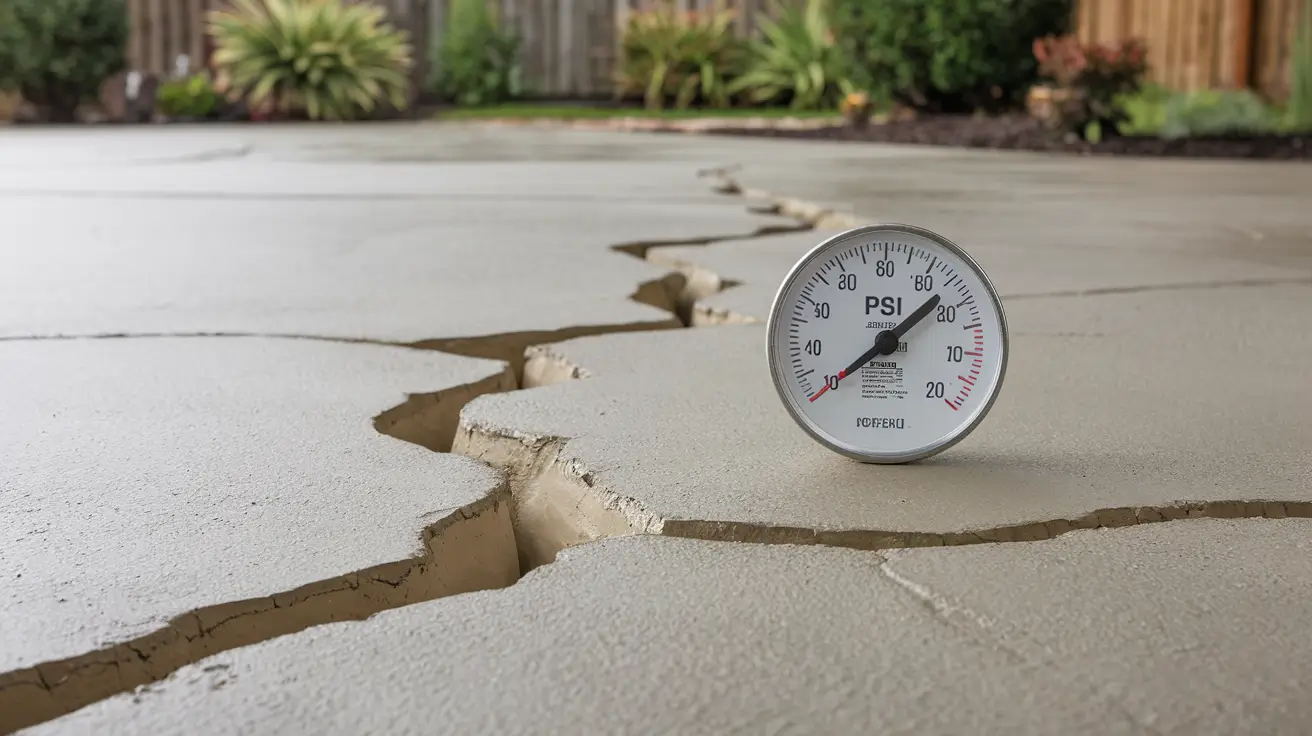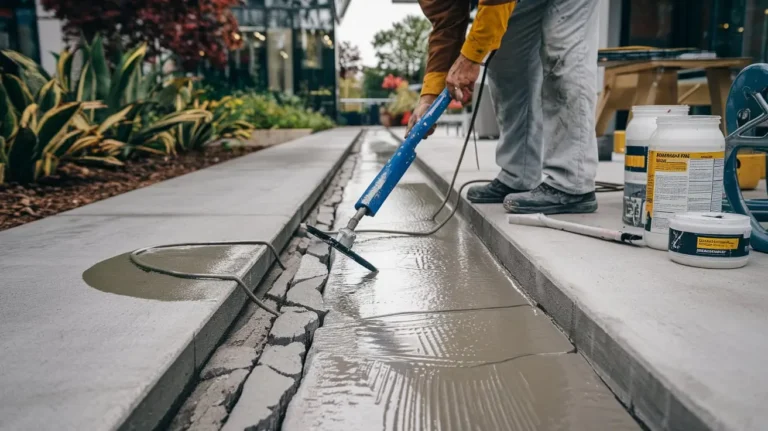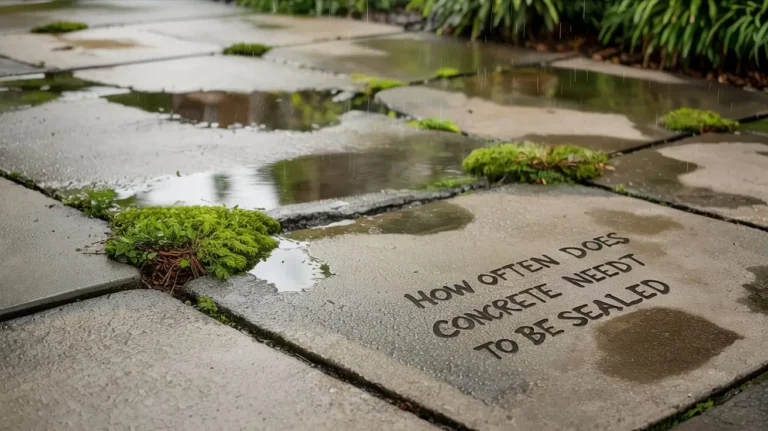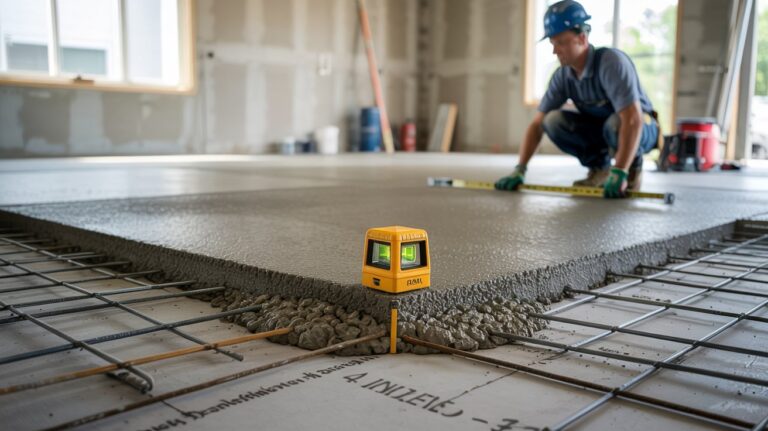Recommended Psi for Concrete Driveway
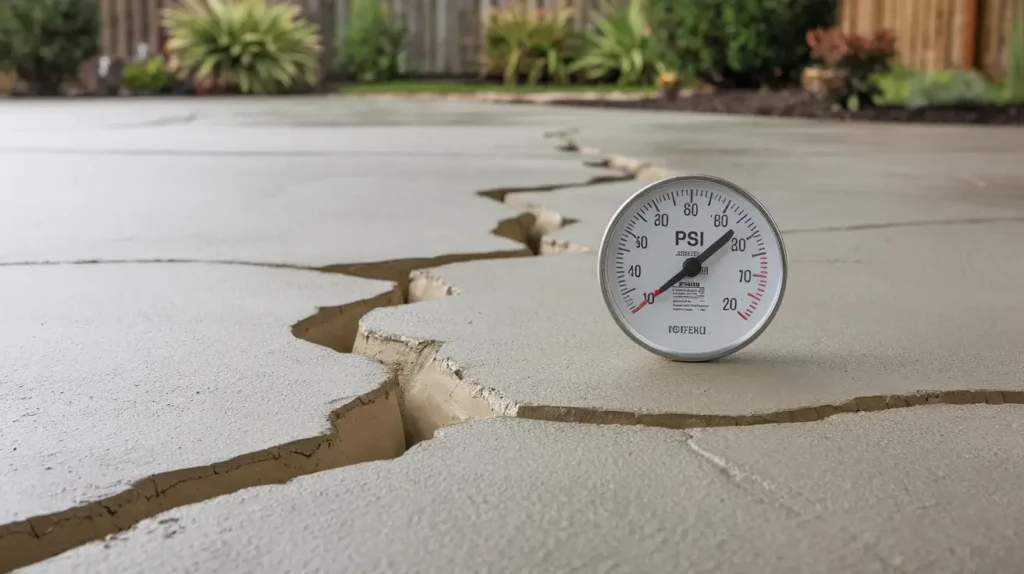
For a concrete driveway, the recommended PSI typically ranges from 2,500 to 5,000. This variation depends on your specific climate, expected usage, and load-bearing capacity.
If you’re in a harsher environment or plan to accommodate heavier vehicles, opt for a higher PSI. For instance, northern regions often require around 4,500 PSI for durability.
Choosing the right mix is vital for the longevity of your driveway, and more insights on this topic await you.
Why PSI Matters for Driveways
Because a driveway is a load-bearing structure that’s exposed to various environmental stressors and heavy usage, understanding why PSI matters for driveways is crucial.
You need to know that PSI measures a material’s strength against compressive forces, determining how well it can withstand loads and environmental factors.
Choosing the right concrete PSI helps guarantee your driveway can endure challenges without premature repairs or replacement. A higher PSI mix provides added strength and durability, making it more resistant to environmental stress.
Ignoring PSI requirements can lead to structural failures and safety hazards. By using the right PSI mix, you can guarantee your concrete can handle the intended load, and a higher PSI rating indicates it can handle more compressive force.
Compressive Strength and Environmental Factors
As you consider the PSI rating for your concrete driveway, you’ll want to think about the compressive strength tests that determine its ability to withstand environmental factors.
In areas with severe weather conditions, you’ll need a higher PSI rating to guarantee your driveway can resist freeze-thaw cycles and heavy loads.
Compressive Strength Tests
When it comes to evaluating concrete’s performance, compressive strength tests are a crucial tool in determining its maximum strength by applying pressure until it fails or cracks, ultimately yielding its PSI rating.
These tests measure a concrete sample‘s ability to withstand compressive force, giving you its PSI rating. A higher PSI rating indicates the concrete can handle more compressive force, making it essential for selecting the right mix for your project.
Weather Resistance Factors
How do environmental factors impact the performance of your concrete driveway? The answer lies in the weather resistance factors that affect your driveway’s compressive strength. As you select the right PSI for your concrete, consider the climate and environmental conditions your driveway will face.
| Environmental Factors | Recommended PSI |
|---|---|
| Harsh winters, freeze-thaw cycles | 4,500 |
| High temperatures, heavy rainfall, de-icing salts | Higher PSI |
| Milder weather, southern regions | 2,500-3,000 |
| Extreme temperatures, humidity, weather patterns | Varies |
A higher PSI rating provides better weather resistance, making it ideal for driveways exposed to harsh weather conditions. Concrete with a higher compressive strength is more impermeable, absorbing less water and better withstanding environmental stresses.
By considering these factors, you can choose the right PSI for your concrete driveway to guarantee its durability and longevity.
PSI Testing and Ideal Ratings
What determines the ideal PSI rating for a concrete driveway?
It’s not a one-size-fits-all answer. The ideal PSI rating varies depending on the intended use, climate, and load-bearing capacity.
- Intended use: Residential driveways require a lower PSI rating, typically between 2,500-3,000 PSI, while commercial or heavily trafficked areas need a higher rating, ranging from 4,000-5,000 PSI.
- Climate: Areas with harsh winters require a higher PSI rating, typically 4,500 PSI, to withstand extreme weather conditions.
- Load-bearing capacity: The weight and frequency of vehicles, pedestrians, or other loads affect the required PSI rating.
- Testing: PSI testing involves evaluating the compressive strength of concrete through pressure tests to determine its maximum strength.
A higher PSI rating indicates a stronger concrete that can handle more compressive force.
Choosing the Right PSI Mix for Your Driveway
When choosing the right PSI mix for your driveway, you’ll need to weigh various concrete strength factors, including climate, terrain, and intended usage.
A PSI mix selection guide can help you determine the ideal rating based on your specific needs, taking into account factors like vehicle load, towing capacity, and driving speed.
Concrete Strength Factors
Your driveway’s structural integrity relies heavily on the concrete’s strength, which is measured in pounds per square inch (PSI).
A higher PSI rating indicates greater concrete strength, and it’s vital to select the right PSI mix for your project.
- Load-bearing capacity: The weight your driveway will bear affects the required PSI. More weight means you’ll need a higher PSI mix.
- Mix composition: The type and amount of cement, aggregate, sand, water, and air in the mix impact the PSI rating. More cement typically results in a higher PSI rating.
- Traffic and usage: If your driveway will see heavy traffic or frequent use, you’ll need a higher PSI mix to guarantee durability.
- Structural requirements: Consult with a contractor or supplier to determine the best PSI mix for your project,
as ignoring PSI requirements can lead to structural failures and safety hazards.
PSI Mix Selection Guide
Selecting the right PSI mix for your driveway is crucial to guarantee its structural integrity and durability.
When it comes to residential driveways, a PSI range of 2,500-3,000 is typically sufficient. However, if you’re planning to use your driveway for heavier applications, such as RV slabs or beams supporting a home, you’ll need a PSI mix of 3,500-4,000.
To certify you’re selecting the appropriate PSI mix, consider the project’s specific requirements and load-bearing capacity. Consult with a contractor or supplier to determine the best PSI mix for your needs.
A higher PSI mix provides added strength and durability, making it ideal for serious home workshops with heavy equipment.
Driveway Load Capacity
To guarantee your driveway can handle the weight of your vehicles and withstand environmental stresses, you need to ponder its load capacity.
The right PSI mix is vital to certify your concrete driveway can withstand heavy loads.
Consider the following factors to determine the ideal PSI mix for your driveway:
- Residential driveways and sidewalks: 2,500-3,000 PSI is typically sufficient, but higher PSI mixes may be required for heavier loads or harsh weather conditions.
- Heavy vehicle traffic: 3,500-4,000 PSI for driveways supporting RVs or heavier vehicles.
- Commercial spaces with heavy traffic: 4,000-5,000 PSI to withstand increased load capacity.
- Severe weather conditions: 4,500-5,000 PSI to certify the driveway can withstand freeze-thaw cycles and environmental stresses.
Factors Affecting Concrete Strength and Durability
What determines the ideal concrete strength for a driveway? It’s not just about slapping down a layer of concrete and hoping for the best.
The correct PSI for your concrete driveway depends on various factors, including climate, terrain, intended usage, vehicle load, and towing capacity. Harsher weather conditions and heavier loads require higher PSI ratings.
For instance, 4500 PSI concrete is recommended for driveways in areas with harsh winters. The type and amount of aggregate, sand, water, and air in the mix also impact the PSI rating.
A critical factor is the water-cement ratio, which should be no higher than 0.45 for severe weather regions. By considering these factors, you can achieve high PSI concrete that provides added strength and durability for your concrete driveways.
Permeable Pavers: A Stronger and More Sustainable Alternative
As you weigh your options for a concrete driveway, consider an innovative alternative that’s gaining traction: permeable pavers.
These pavers offer a stronger and more sustainable solution for residential applications. Here are just a few benefits:
- Higher strength: TRUEGRID permeable pavers have a tested compressive strength of over 17,000 psi, outperforming traditional concrete.
- Water management: Permeable pavers reduce water runoff by allowing rainwater to permeate through the gaps and into the ground below.
- Durability: Unlike traditional concrete, permeable pavers are resistant to cracking, shifting, and erosion, making them a low-maintenance option.
- Cost-effective installation: The installation process is quicker and less labor-intensive, resulting in lower costs and less disruption to daily activities.
Permeable pavers provide a blend of higher strength, durability, environmental sustainability, and longevity that traditional concrete can’t compete with, making them an attractive alternative for homeowners and businesses.
Regional Variations in Concrete PSI Requirements
When selecting a concrete driveway, you must consider the regional variations in PSI requirements, which depend on environmental factors such as climate, terrain, and intended usage.
In southern regions with milder weather, a lower PSI of 3000 may be sufficient for driveways and residential structures. However, in areas with harsh winters, a higher concrete PSI of 4500 is recommended to withstand freeze-thaw cycles.
The American Concrete Institute suggests a higher concrete PSI for regions with severe weather conditions, such as high temperatures, heavy rainfall, or extreme cold. You should adjust your concrete mix accordingly to guarantee the durability and longevity of your driveway.
Ensuring a Long-Lasting Driveway With Proper Installation and Maintenance
By carefully controlling the installation process and performing regular maintenance, you can substantially extend the lifespan of your concrete driveway.
Four key steps to guarantee your driveways remain durable:
- Use the Right PSI: Opt for a 4500 PSI mix, especially in harsh climates, for superior strength.
- Seal Regularly: Apply sealant every 2-3 years to protect against moisture and chemicals.
- Clean Thoroughly: Remove debris, oil stains, and dirt to prevent surface wear and degradation.
- Repair Promptly: Address cracks and damage immediately to prevent further deterioration.
Adhering to these practices, along with following ACI guidelines, will guarantee a high-quality, long-lasting driveway that withstands heavy loads and severe weather conditions.
Frequently Asked Questions
Is 2500 PSI Concrete Good for Driveway?
When considering driveway construction, 2500 PSI concrete can suffice for light residential use. Focus on proper concrete finish and regular driveway maintenance, but guarantee you’re prepared for potential cracking with heavier loads or harsh conditions.
When Should I Use 5000 PSI Concrete?
With 5000 PSI concrete’s ability to withstand 40% more compressive strength, you should use it in high-stress areas. Opt for this concrete mixture when expecting heavy traffic or harsh weather conditions to guarantee maximum durability and performance.
Is 5000 PSI Concrete Good for a Driveway?
Yes, 5000 PSI concrete enhances driveway durability and reduces maintenance needs during pavement construction. It’s ideal for heavy traffic and harsh climates, ensuring your driveway withstands wear while minimizing future repair costs.
Is 3000 PSI Good for a Driveway?
You’ll find that 3000 psi is generally sufficient for driveway construction, meeting concrete mixing psi standards for light to moderate traffic. However, consider higher psi for increased durability in more demanding conditions or heavier loads.
Conclusion
By choosing the right PSI for your concrete driveway, you’re setting a solid foundation for durability and longevity. Think of it as selecting the right armor for a knight; without it, even the mightiest may falter.
Statistics show that driveways with at least 4,000 PSI can withstand heavy loads and various weather conditions. So, invest time in planning and execution, and your driveway will not only support your vehicles but also enhance your property’s value for years to come.
